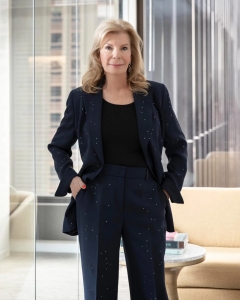Princess Yasmin Aga Khan:Women with a Purpose 2025-08-26
In a world where appearances often overshadow purpose, Princess Yasmin Aga Khan stands out for her unwavering dedication. The daughter of Hollywood icon Rita Hayworth and Prince Aly Khan, she has spent over four decades championing the fight against Alzheimer’s, driven by her mother’s diagnosis in 1981. Through her work with the Alzheimer’s Association and initiatives like the Rita Hayworth Gala, she has transformed personal experience into a powerful global mission.
In our latest Women with Purpose interview, she reflects on her advocacy journey, the strength she found in community, and what continues to fuel her commitment.
People affected by Alzheimer’s often still feel hesitant to speak openly about the disease. Who or what encouraged you to first speak publicly about your mother’s Alzheimer’s?
I felt very alone when caring for my mother with Alzheimer’s. I didn’t realize then that feeling isolated is common among caregivers and those living with the disease. By sharing her diagnosis, I hoped others might feel less alone. Shortly after, Jerome Stone reached out and invited me to be part of a new organization he founded — the Alzheimer’s Association. That marked the start of a meaningful friendship and my lifelong advocacy for Alzheimer’s.
In your years of advocacy, how has the dialogue around Alzheimer’s changed?
I began advocating for Alzheimer’s in 1983, when I was among the first to testify before Congress for increased research funding. In 1984, I founded the Rita Hayworth Galas, which have raised over $90 million and brought greater awareness to the cause. In 1988, a small group of us from the Association met with President Ronald Reagan — a close friend of my mother’s — who declared November National Alzheimer’s Disease Awareness Month, a tradition that continues today.
Over the past forty years, I’ve seen the dialogue around Alzheimer’s change dramatically. Once a disease in the shadows, Alzheimer’s is now a national priority. While there is still much work to be done, I’m incredibly proud of how far we’ve come — and I know we won’t stop until we find a cure. I encourage the next generation to embrace this momentum and keep it going. We’re so fortunate to have so many young people taking up the fight through our events. It really adds an incredible energy to the movement.
Living life alongside someone with Alzheimer’s can be incredibly challenging. What was a source of empowerment for you?
Finding a community of support was essential. Connecting with others who were working to make a difference empowered me. I knew I had to use my platform to help shift the narrative and create change.
When it comes to advice: are there any ‘words you live by’ that you can share to inspire?
Don’t underestimate the power one person has to change the world. We may feel that we are just one voice, but your voice may be representing millions of people experiencing the same thing. In my case, I feel my mother's story helped to give a voice to the millions of people who are impacted by this disease. Each one of us can represent hope and inspire others to take action.
Nearly two-thirds of Americans living with Alzheimer’s are women. Sixty percent of caregivers are women. Women are at the epicenter of Alzheimer’s — do you feel a special responsibility to raise awareness among women?
Of course! Just as I made sacrifices to care for my mother when she had the disease, so many women are facing the same situation today.
Not only are women more likely to develop Alzheimer’s, they are also more likely to serve as caregivers. The risk for women developing Alzheimer’s is 1 in 5 — compared to 1 in 11 for breast cancer. Even more, over one-third of dementia caregivers are daughters, like I was. While the reasons women are disproportionately affected remain unclear, the Alzheimer’s Association supports a number of ongoing research to better understand gender differences in the disease.
One way we raise awareness and honor the women affected is through our Chicago Rita Hayworth Gala. We make a point of hosting the event on Mother’s Day weekend each year — as a tribute to my mother and to the many matriarchs and caregivers in the room.
What does purpose mean to you?
I turned my pain into my purpose. When I shared my mother’s diagnosis with the world, I didn’t expect Alzheimer’s advocacy to become my life’s work but sometimes our purpose is not something we seek. It can find us.
- 1235 reads
 Ismaili.NET - Heritage F.I.E.L.D.
Ismaili.NET - Heritage F.I.E.L.D.